MBA7008 Managing People in a Globalized Context
VerifiedAdded on 2021/01/07
|14
|2994
|76
AI Summary
Contribute Materials
Your contribution can guide someone’s learning journey. Share your
documents today.
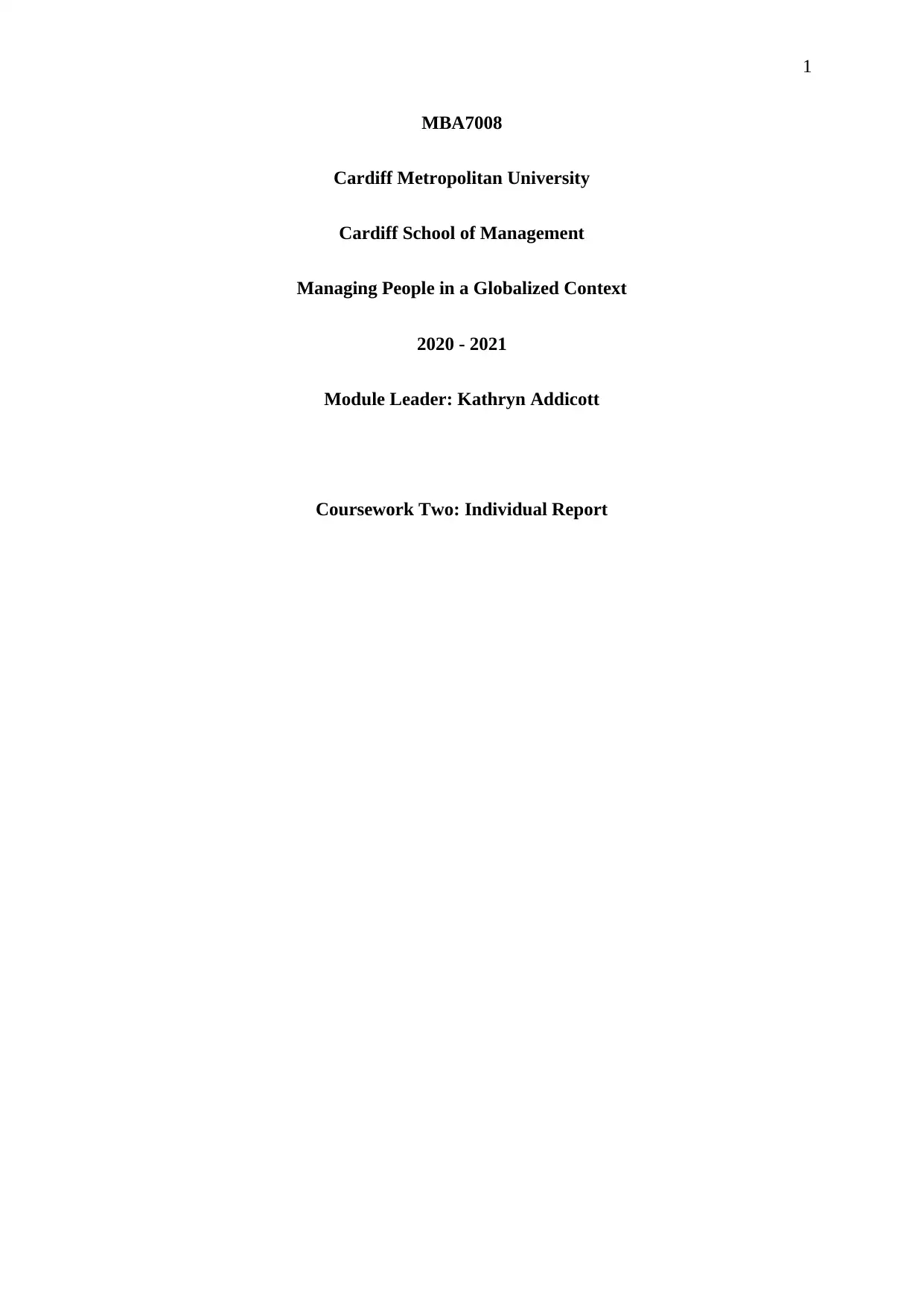
1
MBA7008
Cardiff Metropolitan University
Cardiff School of Management
Managing People in a Globalized Context
2020 - 2021
Module Leader: Kathryn Addicott
Coursework Two: Individual Report
MBA7008
Cardiff Metropolitan University
Cardiff School of Management
Managing People in a Globalized Context
2020 - 2021
Module Leader: Kathryn Addicott
Coursework Two: Individual Report
Secure Best Marks with AI Grader
Need help grading? Try our AI Grader for instant feedback on your assignments.
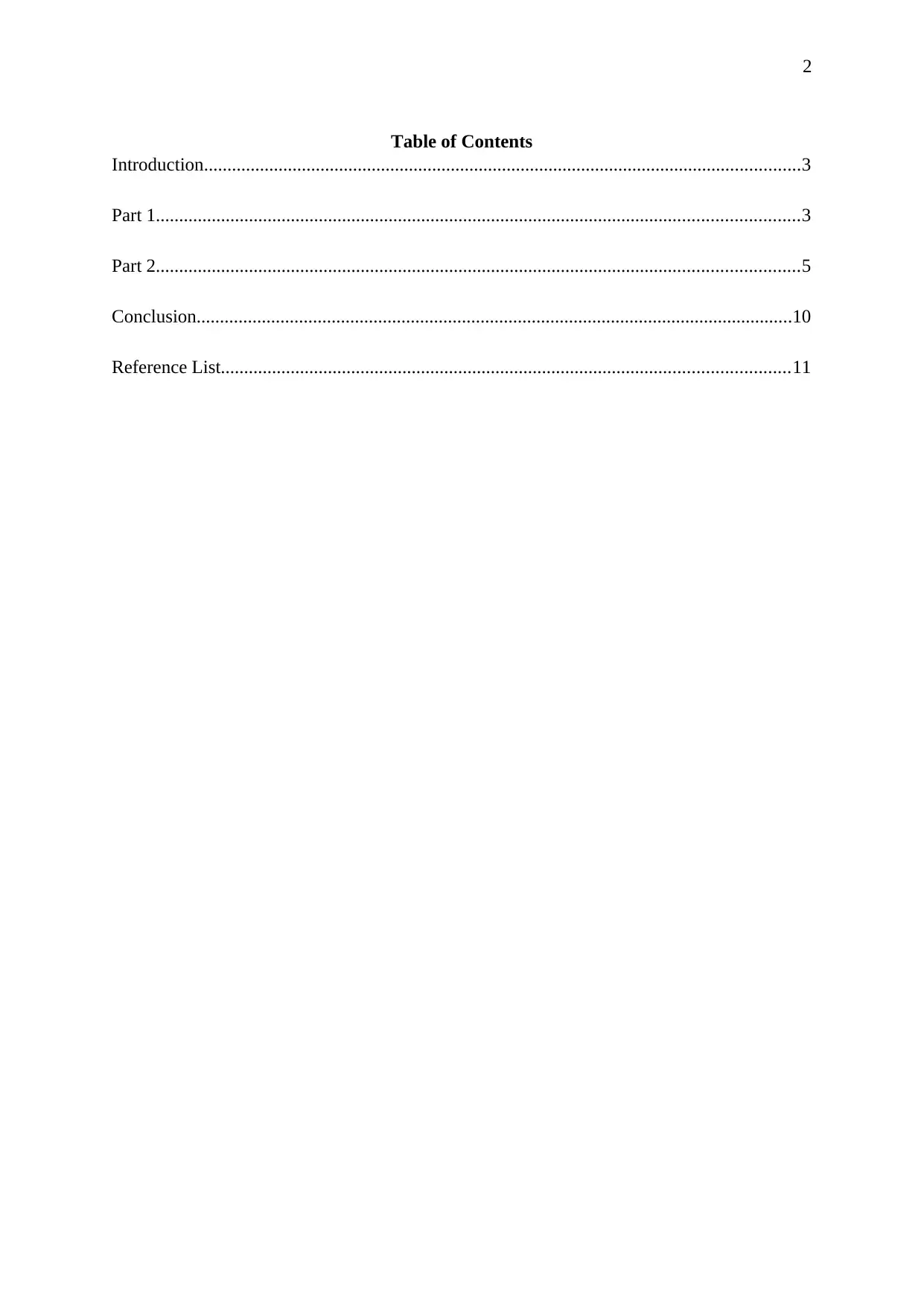
2
Table of Contents
Introduction................................................................................................................................3
Part 1..........................................................................................................................................3
Part 2..........................................................................................................................................5
Conclusion................................................................................................................................10
Reference List..........................................................................................................................11
Table of Contents
Introduction................................................................................................................................3
Part 1..........................................................................................................................................3
Part 2..........................................................................................................................................5
Conclusion................................................................................................................................10
Reference List..........................................................................................................................11
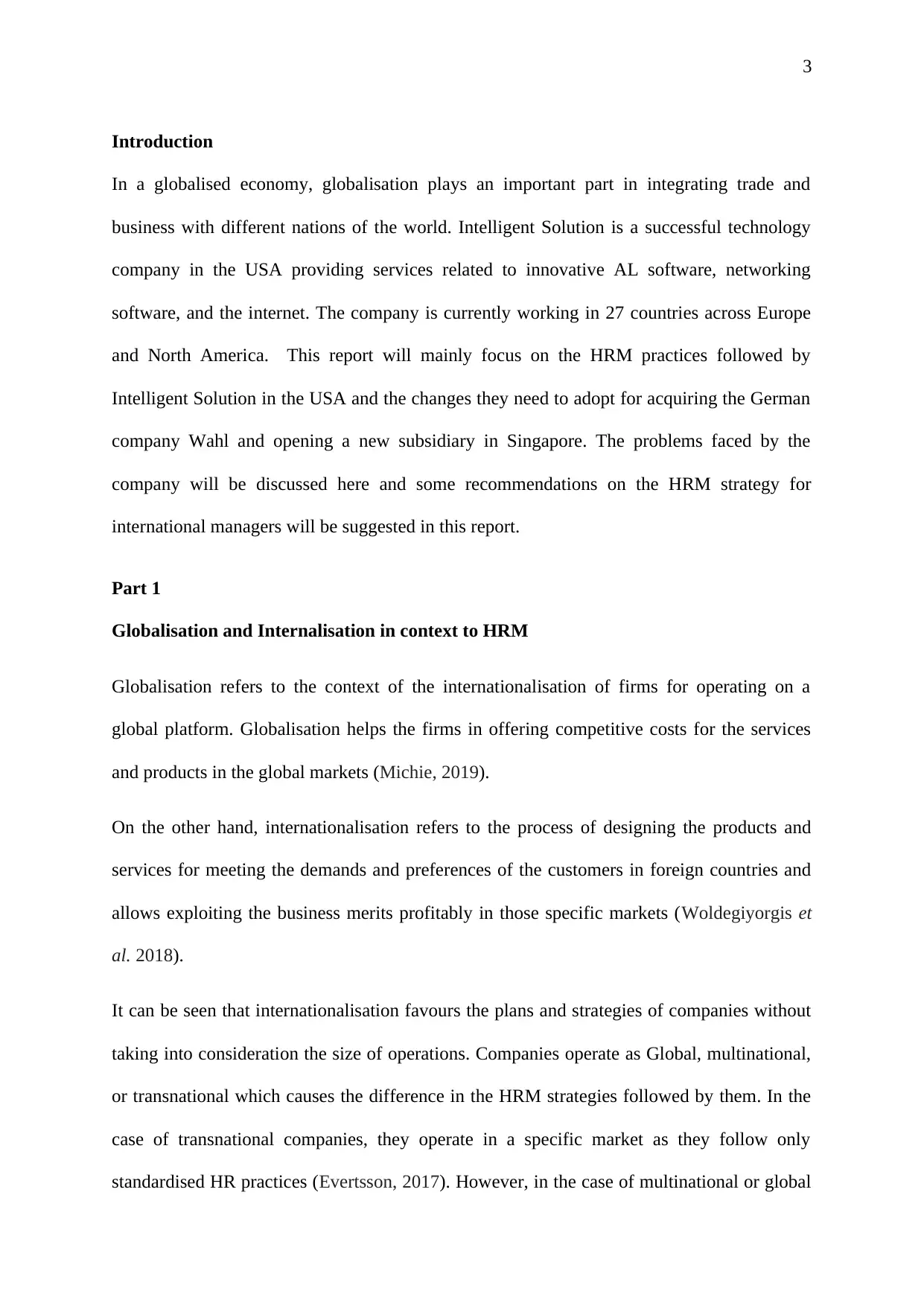
3
Introduction
In a globalised economy, globalisation plays an important part in integrating trade and
business with different nations of the world. Intelligent Solution is a successful technology
company in the USA providing services related to innovative AL software, networking
software, and the internet. The company is currently working in 27 countries across Europe
and North America. This report will mainly focus on the HRM practices followed by
Intelligent Solution in the USA and the changes they need to adopt for acquiring the German
company Wahl and opening a new subsidiary in Singapore. The problems faced by the
company will be discussed here and some recommendations on the HRM strategy for
international managers will be suggested in this report.
Part 1
Globalisation and Internalisation in context to HRM
Globalisation refers to the context of the internationalisation of firms for operating on a
global platform. Globalisation helps the firms in offering competitive costs for the services
and products in the global markets (Michie, 2019).
On the other hand, internationalisation refers to the process of designing the products and
services for meeting the demands and preferences of the customers in foreign countries and
allows exploiting the business merits profitably in those specific markets (Woldegiyorgis et
al. 2018).
It can be seen that internationalisation favours the plans and strategies of companies without
taking into consideration the size of operations. Companies operate as Global, multinational,
or transnational which causes the difference in the HRM strategies followed by them. In the
case of transnational companies, they operate in a specific market as they follow only
standardised HR practices (Evertsson, 2017). However, in the case of multinational or global
Introduction
In a globalised economy, globalisation plays an important part in integrating trade and
business with different nations of the world. Intelligent Solution is a successful technology
company in the USA providing services related to innovative AL software, networking
software, and the internet. The company is currently working in 27 countries across Europe
and North America. This report will mainly focus on the HRM practices followed by
Intelligent Solution in the USA and the changes they need to adopt for acquiring the German
company Wahl and opening a new subsidiary in Singapore. The problems faced by the
company will be discussed here and some recommendations on the HRM strategy for
international managers will be suggested in this report.
Part 1
Globalisation and Internalisation in context to HRM
Globalisation refers to the context of the internationalisation of firms for operating on a
global platform. Globalisation helps the firms in offering competitive costs for the services
and products in the global markets (Michie, 2019).
On the other hand, internationalisation refers to the process of designing the products and
services for meeting the demands and preferences of the customers in foreign countries and
allows exploiting the business merits profitably in those specific markets (Woldegiyorgis et
al. 2018).
It can be seen that internationalisation favours the plans and strategies of companies without
taking into consideration the size of operations. Companies operate as Global, multinational,
or transnational which causes the difference in the HRM strategies followed by them. In the
case of transnational companies, they operate in a specific market as they follow only
standardised HR practices (Evertsson, 2017). However, in the case of multinational or global
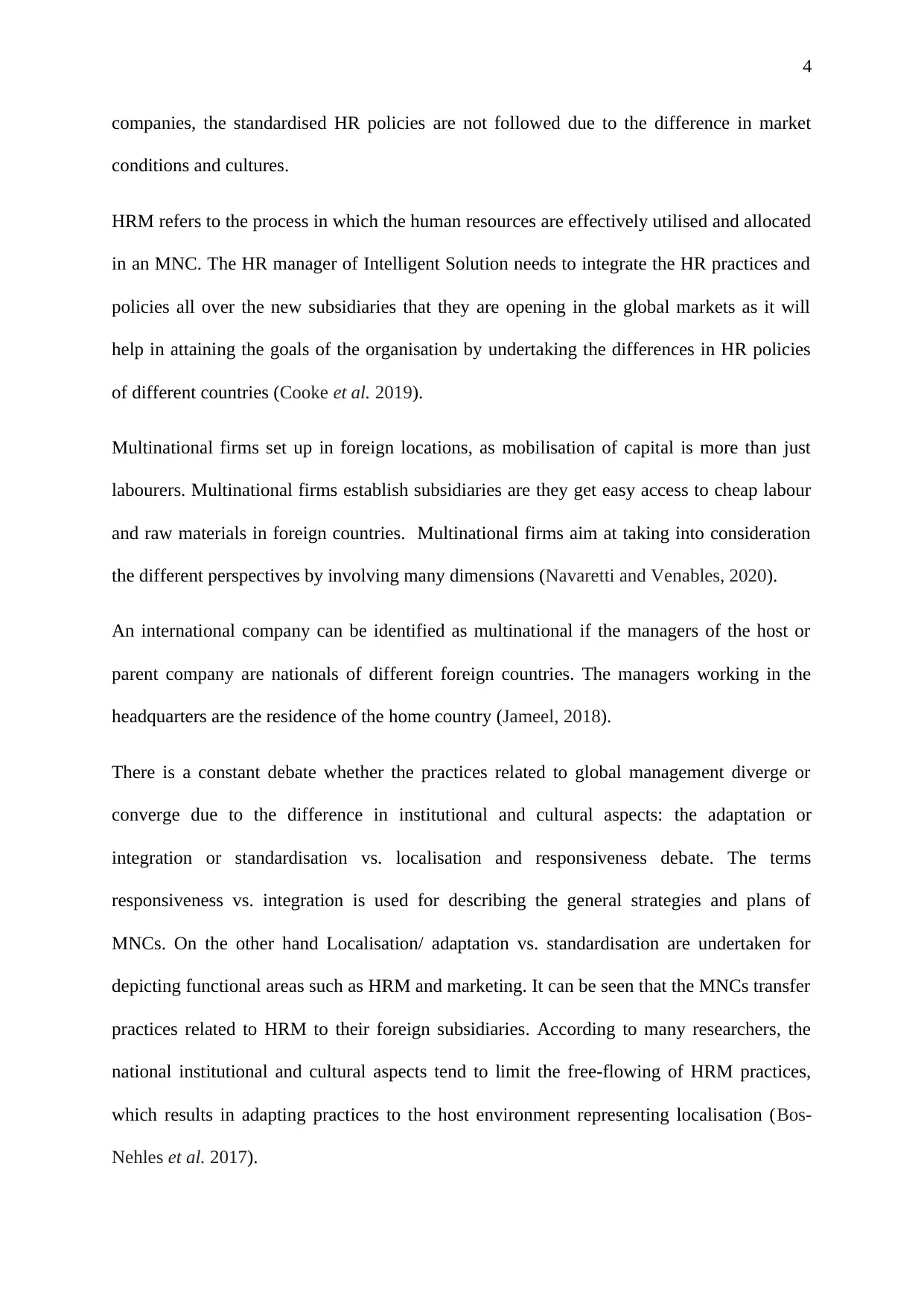
4
companies, the standardised HR policies are not followed due to the difference in market
conditions and cultures.
HRM refers to the process in which the human resources are effectively utilised and allocated
in an MNC. The HR manager of Intelligent Solution needs to integrate the HR practices and
policies all over the new subsidiaries that they are opening in the global markets as it will
help in attaining the goals of the organisation by undertaking the differences in HR policies
of different countries (Cooke et al. 2019).
Multinational firms set up in foreign locations, as mobilisation of capital is more than just
labourers. Multinational firms establish subsidiaries are they get easy access to cheap labour
and raw materials in foreign countries. Multinational firms aim at taking into consideration
the different perspectives by involving many dimensions (Navaretti and Venables, 2020).
An international company can be identified as multinational if the managers of the host or
parent company are nationals of different foreign countries. The managers working in the
headquarters are the residence of the home country (Jameel, 2018).
There is a constant debate whether the practices related to global management diverge or
converge due to the difference in institutional and cultural aspects: the adaptation or
integration or standardisation vs. localisation and responsiveness debate. The terms
responsiveness vs. integration is used for describing the general strategies and plans of
MNCs. On the other hand Localisation/ adaptation vs. standardisation are undertaken for
depicting functional areas such as HRM and marketing. It can be seen that the MNCs transfer
practices related to HRM to their foreign subsidiaries. According to many researchers, the
national institutional and cultural aspects tend to limit the free-flowing of HRM practices,
which results in adapting practices to the host environment representing localisation (Bos-
Nehles et al. 2017).
companies, the standardised HR policies are not followed due to the difference in market
conditions and cultures.
HRM refers to the process in which the human resources are effectively utilised and allocated
in an MNC. The HR manager of Intelligent Solution needs to integrate the HR practices and
policies all over the new subsidiaries that they are opening in the global markets as it will
help in attaining the goals of the organisation by undertaking the differences in HR policies
of different countries (Cooke et al. 2019).
Multinational firms set up in foreign locations, as mobilisation of capital is more than just
labourers. Multinational firms establish subsidiaries are they get easy access to cheap labour
and raw materials in foreign countries. Multinational firms aim at taking into consideration
the different perspectives by involving many dimensions (Navaretti and Venables, 2020).
An international company can be identified as multinational if the managers of the host or
parent company are nationals of different foreign countries. The managers working in the
headquarters are the residence of the home country (Jameel, 2018).
There is a constant debate whether the practices related to global management diverge or
converge due to the difference in institutional and cultural aspects: the adaptation or
integration or standardisation vs. localisation and responsiveness debate. The terms
responsiveness vs. integration is used for describing the general strategies and plans of
MNCs. On the other hand Localisation/ adaptation vs. standardisation are undertaken for
depicting functional areas such as HRM and marketing. It can be seen that the MNCs transfer
practices related to HRM to their foreign subsidiaries. According to many researchers, the
national institutional and cultural aspects tend to limit the free-flowing of HRM practices,
which results in adapting practices to the host environment representing localisation (Bos-
Nehles et al. 2017).
Secure Best Marks with AI Grader
Need help grading? Try our AI Grader for instant feedback on your assignments.
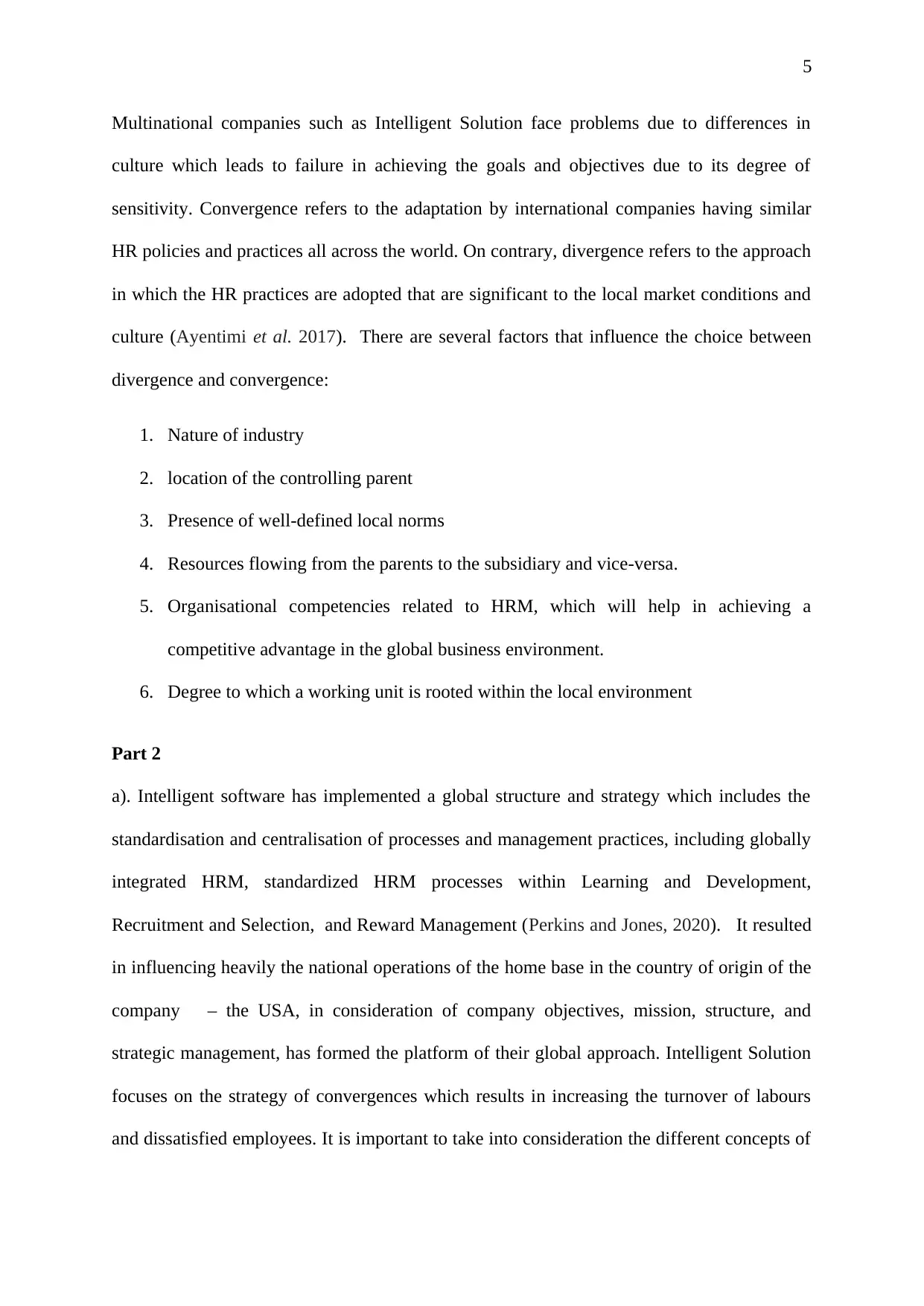
5
Multinational companies such as Intelligent Solution face problems due to differences in
culture which leads to failure in achieving the goals and objectives due to its degree of
sensitivity. Convergence refers to the adaptation by international companies having similar
HR policies and practices all across the world. On contrary, divergence refers to the approach
in which the HR practices are adopted that are significant to the local market conditions and
culture (Ayentimi et al. 2017). There are several factors that influence the choice between
divergence and convergence:
1. Nature of industry
2. location of the controlling parent
3. Presence of well-defined local norms
4. Resources flowing from the parents to the subsidiary and vice-versa.
5. Organisational competencies related to HRM, which will help in achieving a
competitive advantage in the global business environment.
6. Degree to which a working unit is rooted within the local environment
Part 2
a). Intelligent software has implemented a global structure and strategy which includes the
standardisation and centralisation of processes and management practices, including globally
integrated HRM, standardized HRM processes within Learning and Development,
Recruitment and Selection, and Reward Management (Perkins and Jones, 2020). It resulted
in influencing heavily the national operations of the home base in the country of origin of the
company – the USA, in consideration of company objectives, mission, structure, and
strategic management, has formed the platform of their global approach. Intelligent Solution
focuses on the strategy of convergences which results in increasing the turnover of labours
and dissatisfied employees. It is important to take into consideration the different concepts of
Multinational companies such as Intelligent Solution face problems due to differences in
culture which leads to failure in achieving the goals and objectives due to its degree of
sensitivity. Convergence refers to the adaptation by international companies having similar
HR policies and practices all across the world. On contrary, divergence refers to the approach
in which the HR practices are adopted that are significant to the local market conditions and
culture (Ayentimi et al. 2017). There are several factors that influence the choice between
divergence and convergence:
1. Nature of industry
2. location of the controlling parent
3. Presence of well-defined local norms
4. Resources flowing from the parents to the subsidiary and vice-versa.
5. Organisational competencies related to HRM, which will help in achieving a
competitive advantage in the global business environment.
6. Degree to which a working unit is rooted within the local environment
Part 2
a). Intelligent software has implemented a global structure and strategy which includes the
standardisation and centralisation of processes and management practices, including globally
integrated HRM, standardized HRM processes within Learning and Development,
Recruitment and Selection, and Reward Management (Perkins and Jones, 2020). It resulted
in influencing heavily the national operations of the home base in the country of origin of the
company – the USA, in consideration of company objectives, mission, structure, and
strategic management, has formed the platform of their global approach. Intelligent Solution
focuses on the strategy of convergences which results in increasing the turnover of labours
and dissatisfied employees. It is important to take into consideration the different concepts of
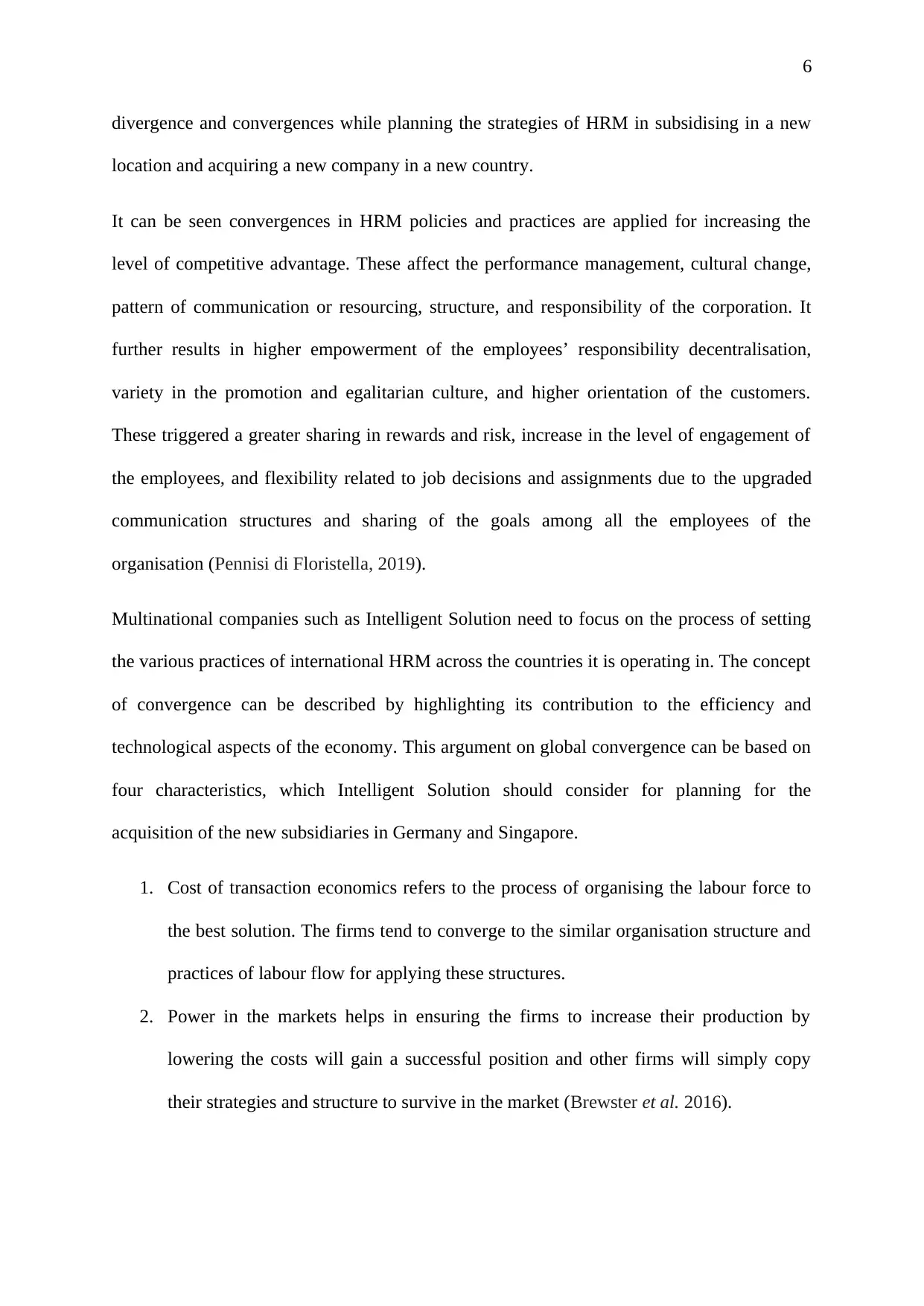
6
divergence and convergences while planning the strategies of HRM in subsidising in a new
location and acquiring a new company in a new country.
It can be seen convergences in HRM policies and practices are applied for increasing the
level of competitive advantage. These affect the performance management, cultural change,
pattern of communication or resourcing, structure, and responsibility of the corporation. It
further results in higher empowerment of the employees’ responsibility decentralisation,
variety in the promotion and egalitarian culture, and higher orientation of the customers.
These triggered a greater sharing in rewards and risk, increase in the level of engagement of
the employees, and flexibility related to job decisions and assignments due to the upgraded
communication structures and sharing of the goals among all the employees of the
organisation (Pennisi di Floristella, 2019).
Multinational companies such as Intelligent Solution need to focus on the process of setting
the various practices of international HRM across the countries it is operating in. The concept
of convergence can be described by highlighting its contribution to the efficiency and
technological aspects of the economy. This argument on global convergence can be based on
four characteristics, which Intelligent Solution should consider for planning for the
acquisition of the new subsidiaries in Germany and Singapore.
1. Cost of transaction economics refers to the process of organising the labour force to
the best solution. The firms tend to converge to the similar organisation structure and
practices of labour flow for applying these structures.
2. Power in the markets helps in ensuring the firms to increase their production by
lowering the costs will gain a successful position and other firms will simply copy
their strategies and structure to survive in the market (Brewster et al. 2016).
divergence and convergences while planning the strategies of HRM in subsidising in a new
location and acquiring a new company in a new country.
It can be seen convergences in HRM policies and practices are applied for increasing the
level of competitive advantage. These affect the performance management, cultural change,
pattern of communication or resourcing, structure, and responsibility of the corporation. It
further results in higher empowerment of the employees’ responsibility decentralisation,
variety in the promotion and egalitarian culture, and higher orientation of the customers.
These triggered a greater sharing in rewards and risk, increase in the level of engagement of
the employees, and flexibility related to job decisions and assignments due to the upgraded
communication structures and sharing of the goals among all the employees of the
organisation (Pennisi di Floristella, 2019).
Multinational companies such as Intelligent Solution need to focus on the process of setting
the various practices of international HRM across the countries it is operating in. The concept
of convergence can be described by highlighting its contribution to the efficiency and
technological aspects of the economy. This argument on global convergence can be based on
four characteristics, which Intelligent Solution should consider for planning for the
acquisition of the new subsidiaries in Germany and Singapore.
1. Cost of transaction economics refers to the process of organising the labour force to
the best solution. The firms tend to converge to the similar organisation structure and
practices of labour flow for applying these structures.
2. Power in the markets helps in ensuring the firms to increase their production by
lowering the costs will gain a successful position and other firms will simply copy
their strategies and structure to survive in the market (Brewster et al. 2016).
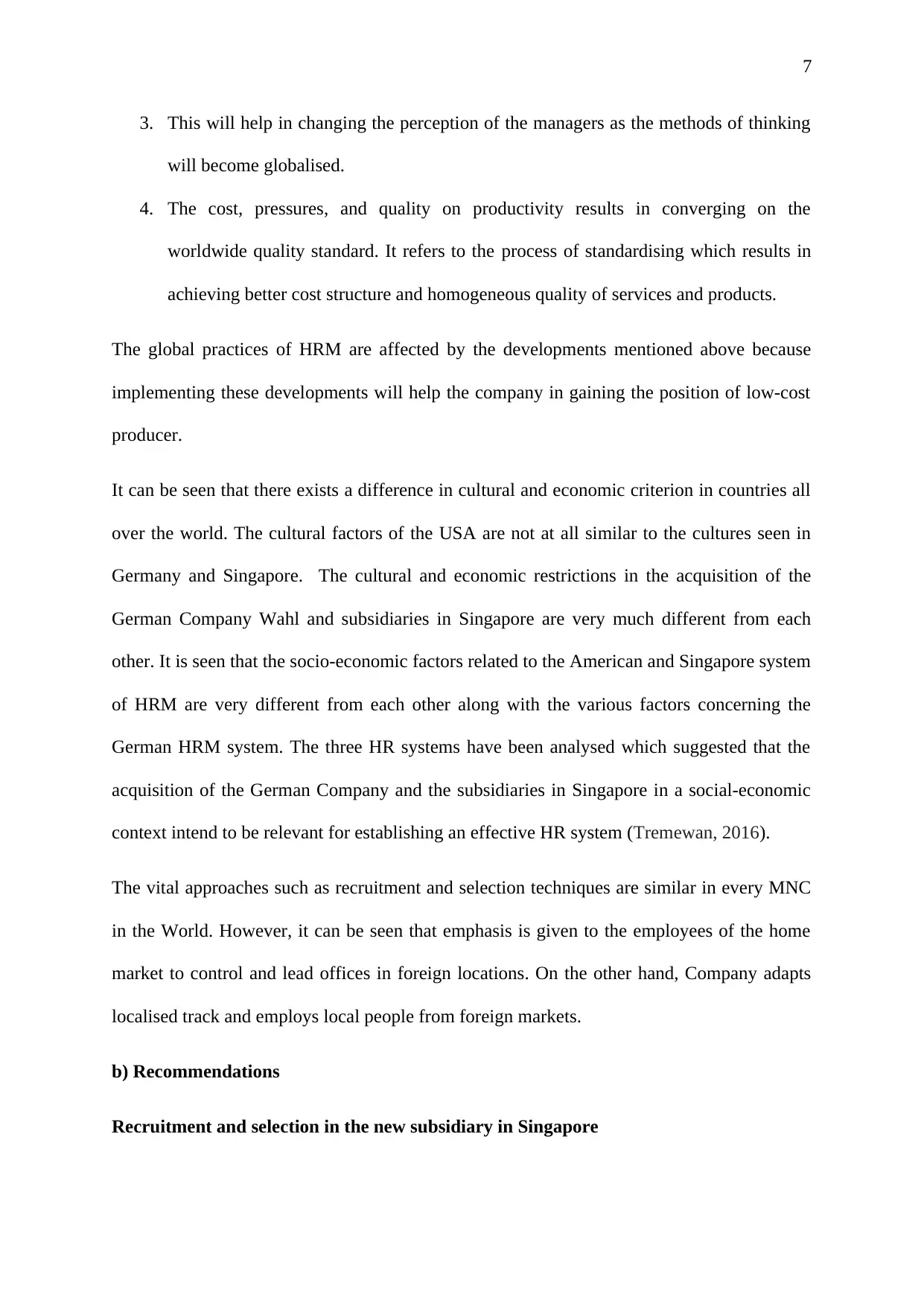
7
3. This will help in changing the perception of the managers as the methods of thinking
will become globalised.
4. The cost, pressures, and quality on productivity results in converging on the
worldwide quality standard. It refers to the process of standardising which results in
achieving better cost structure and homogeneous quality of services and products.
The global practices of HRM are affected by the developments mentioned above because
implementing these developments will help the company in gaining the position of low-cost
producer.
It can be seen that there exists a difference in cultural and economic criterion in countries all
over the world. The cultural factors of the USA are not at all similar to the cultures seen in
Germany and Singapore. The cultural and economic restrictions in the acquisition of the
German Company Wahl and subsidiaries in Singapore are very much different from each
other. It is seen that the socio-economic factors related to the American and Singapore system
of HRM are very different from each other along with the various factors concerning the
German HRM system. The three HR systems have been analysed which suggested that the
acquisition of the German Company and the subsidiaries in Singapore in a social-economic
context intend to be relevant for establishing an effective HR system (Tremewan, 2016).
The vital approaches such as recruitment and selection techniques are similar in every MNC
in the World. However, it can be seen that emphasis is given to the employees of the home
market to control and lead offices in foreign locations. On the other hand, Company adapts
localised track and employs local people from foreign markets.
b) Recommendations
Recruitment and selection in the new subsidiary in Singapore
3. This will help in changing the perception of the managers as the methods of thinking
will become globalised.
4. The cost, pressures, and quality on productivity results in converging on the
worldwide quality standard. It refers to the process of standardising which results in
achieving better cost structure and homogeneous quality of services and products.
The global practices of HRM are affected by the developments mentioned above because
implementing these developments will help the company in gaining the position of low-cost
producer.
It can be seen that there exists a difference in cultural and economic criterion in countries all
over the world. The cultural factors of the USA are not at all similar to the cultures seen in
Germany and Singapore. The cultural and economic restrictions in the acquisition of the
German Company Wahl and subsidiaries in Singapore are very much different from each
other. It is seen that the socio-economic factors related to the American and Singapore system
of HRM are very different from each other along with the various factors concerning the
German HRM system. The three HR systems have been analysed which suggested that the
acquisition of the German Company and the subsidiaries in Singapore in a social-economic
context intend to be relevant for establishing an effective HR system (Tremewan, 2016).
The vital approaches such as recruitment and selection techniques are similar in every MNC
in the World. However, it can be seen that emphasis is given to the employees of the home
market to control and lead offices in foreign locations. On the other hand, Company adapts
localised track and employs local people from foreign markets.
b) Recommendations
Recruitment and selection in the new subsidiary in Singapore
Paraphrase This Document
Need a fresh take? Get an instant paraphrase of this document with our AI Paraphraser
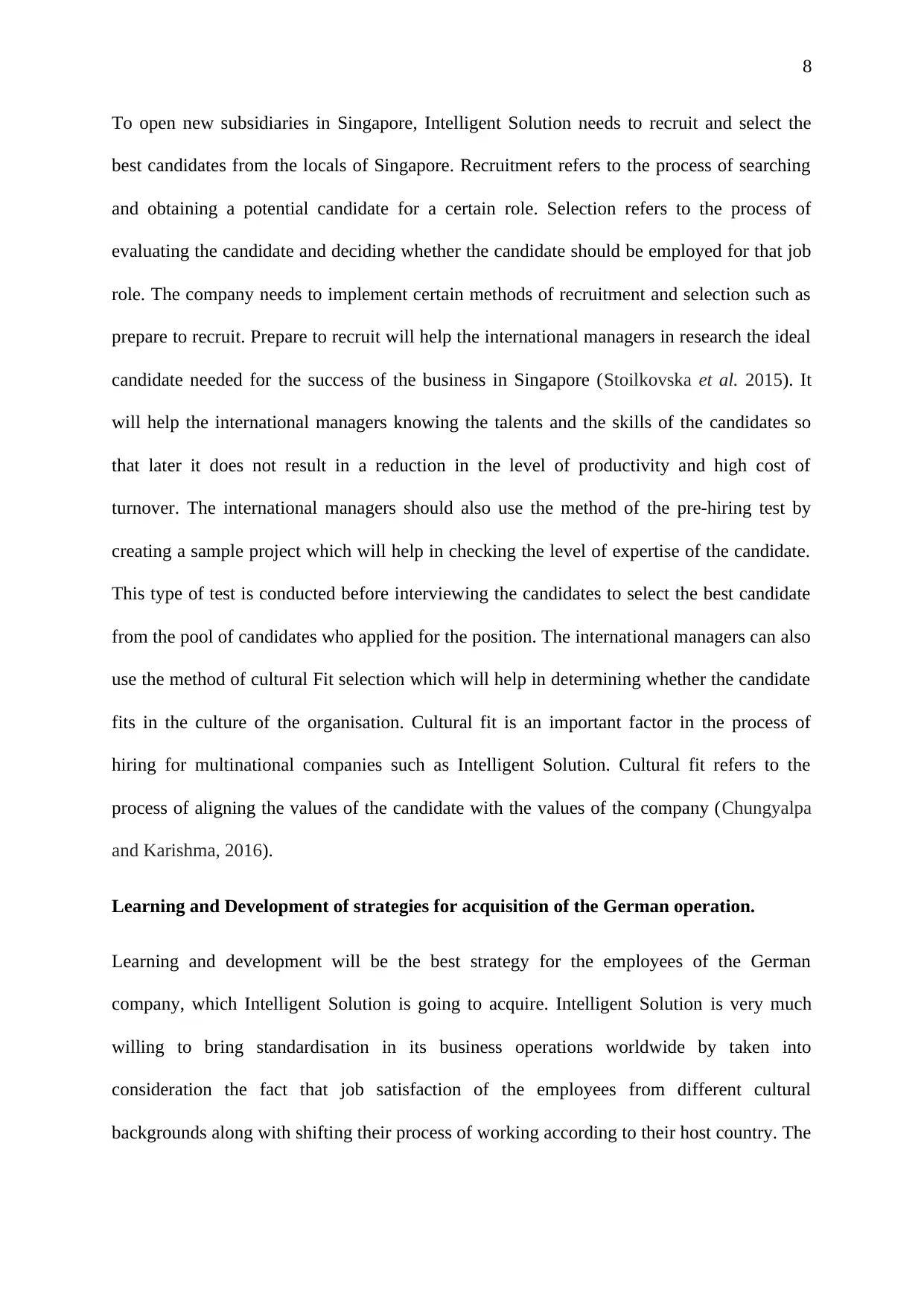
8
To open new subsidiaries in Singapore, Intelligent Solution needs to recruit and select the
best candidates from the locals of Singapore. Recruitment refers to the process of searching
and obtaining a potential candidate for a certain role. Selection refers to the process of
evaluating the candidate and deciding whether the candidate should be employed for that job
role. The company needs to implement certain methods of recruitment and selection such as
prepare to recruit. Prepare to recruit will help the international managers in research the ideal
candidate needed for the success of the business in Singapore (Stoilkovska et al. 2015). It
will help the international managers knowing the talents and the skills of the candidates so
that later it does not result in a reduction in the level of productivity and high cost of
turnover. The international managers should also use the method of the pre-hiring test by
creating a sample project which will help in checking the level of expertise of the candidate.
This type of test is conducted before interviewing the candidates to select the best candidate
from the pool of candidates who applied for the position. The international managers can also
use the method of cultural Fit selection which will help in determining whether the candidate
fits in the culture of the organisation. Cultural fit is an important factor in the process of
hiring for multinational companies such as Intelligent Solution. Cultural fit refers to the
process of aligning the values of the candidate with the values of the company (Chungyalpa
and Karishma, 2016).
Learning and Development of strategies for acquisition of the German operation.
Learning and development will be the best strategy for the employees of the German
company, which Intelligent Solution is going to acquire. Intelligent Solution is very much
willing to bring standardisation in its business operations worldwide by taken into
consideration the fact that job satisfaction of the employees from different cultural
backgrounds along with shifting their process of working according to their host country. The
To open new subsidiaries in Singapore, Intelligent Solution needs to recruit and select the
best candidates from the locals of Singapore. Recruitment refers to the process of searching
and obtaining a potential candidate for a certain role. Selection refers to the process of
evaluating the candidate and deciding whether the candidate should be employed for that job
role. The company needs to implement certain methods of recruitment and selection such as
prepare to recruit. Prepare to recruit will help the international managers in research the ideal
candidate needed for the success of the business in Singapore (Stoilkovska et al. 2015). It
will help the international managers knowing the talents and the skills of the candidates so
that later it does not result in a reduction in the level of productivity and high cost of
turnover. The international managers should also use the method of the pre-hiring test by
creating a sample project which will help in checking the level of expertise of the candidate.
This type of test is conducted before interviewing the candidates to select the best candidate
from the pool of candidates who applied for the position. The international managers can also
use the method of cultural Fit selection which will help in determining whether the candidate
fits in the culture of the organisation. Cultural fit is an important factor in the process of
hiring for multinational companies such as Intelligent Solution. Cultural fit refers to the
process of aligning the values of the candidate with the values of the company (Chungyalpa
and Karishma, 2016).
Learning and Development of strategies for acquisition of the German operation.
Learning and development will be the best strategy for the employees of the German
company, which Intelligent Solution is going to acquire. Intelligent Solution is very much
willing to bring standardisation in its business operations worldwide by taken into
consideration the fact that job satisfaction of the employees from different cultural
backgrounds along with shifting their process of working according to their host country. The
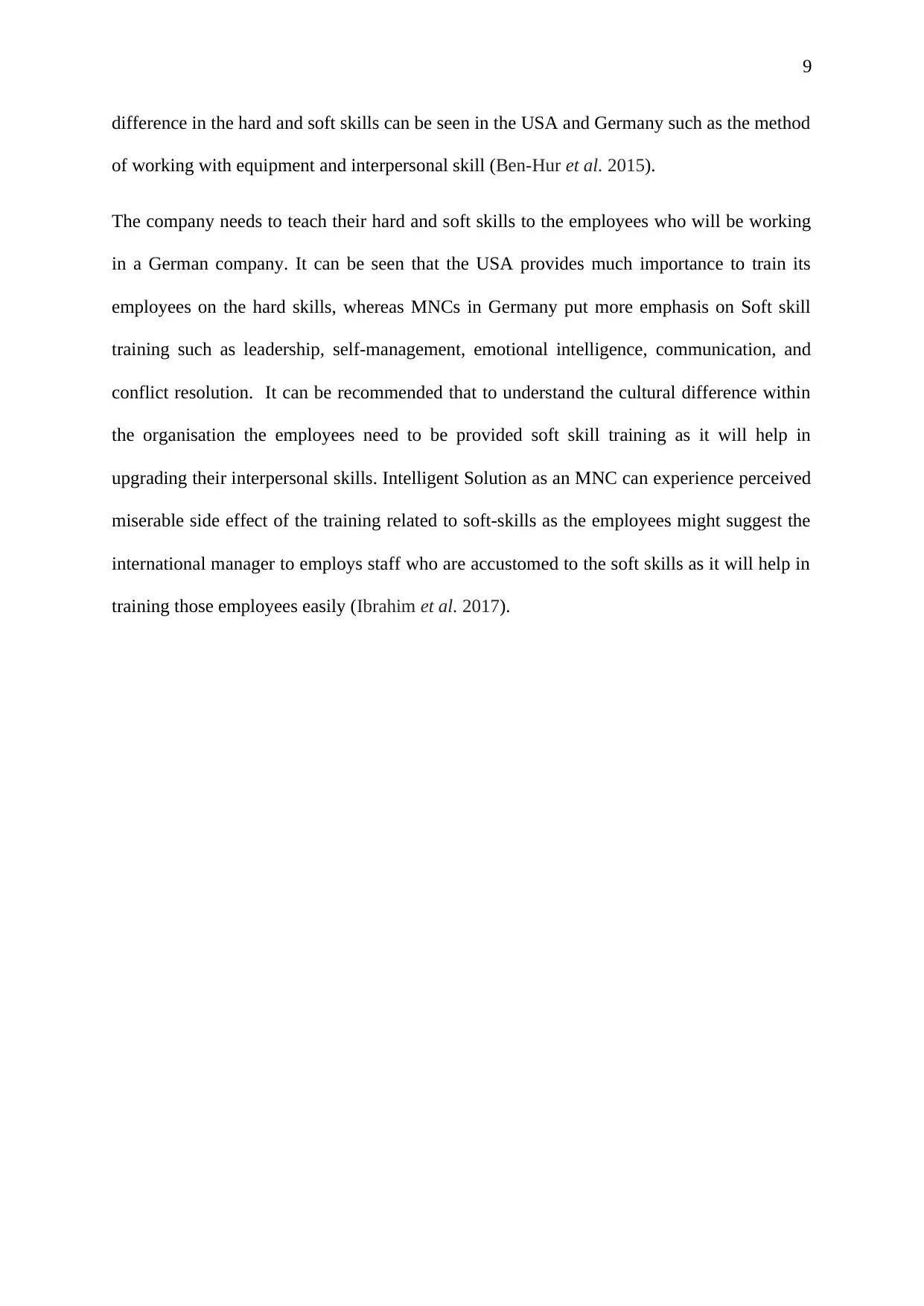
9
difference in the hard and soft skills can be seen in the USA and Germany such as the method
of working with equipment and interpersonal skill (Ben-Hur et al. 2015).
The company needs to teach their hard and soft skills to the employees who will be working
in a German company. It can be seen that the USA provides much importance to train its
employees on the hard skills, whereas MNCs in Germany put more emphasis on Soft skill
training such as leadership, self-management, emotional intelligence, communication, and
conflict resolution. It can be recommended that to understand the cultural difference within
the organisation the employees need to be provided soft skill training as it will help in
upgrading their interpersonal skills. Intelligent Solution as an MNC can experience perceived
miserable side effect of the training related to soft-skills as the employees might suggest the
international manager to employs staff who are accustomed to the soft skills as it will help in
training those employees easily (Ibrahim et al. 2017).
difference in the hard and soft skills can be seen in the USA and Germany such as the method
of working with equipment and interpersonal skill (Ben-Hur et al. 2015).
The company needs to teach their hard and soft skills to the employees who will be working
in a German company. It can be seen that the USA provides much importance to train its
employees on the hard skills, whereas MNCs in Germany put more emphasis on Soft skill
training such as leadership, self-management, emotional intelligence, communication, and
conflict resolution. It can be recommended that to understand the cultural difference within
the organisation the employees need to be provided soft skill training as it will help in
upgrading their interpersonal skills. Intelligent Solution as an MNC can experience perceived
miserable side effect of the training related to soft-skills as the employees might suggest the
international manager to employs staff who are accustomed to the soft skills as it will help in
training those employees easily (Ibrahim et al. 2017).
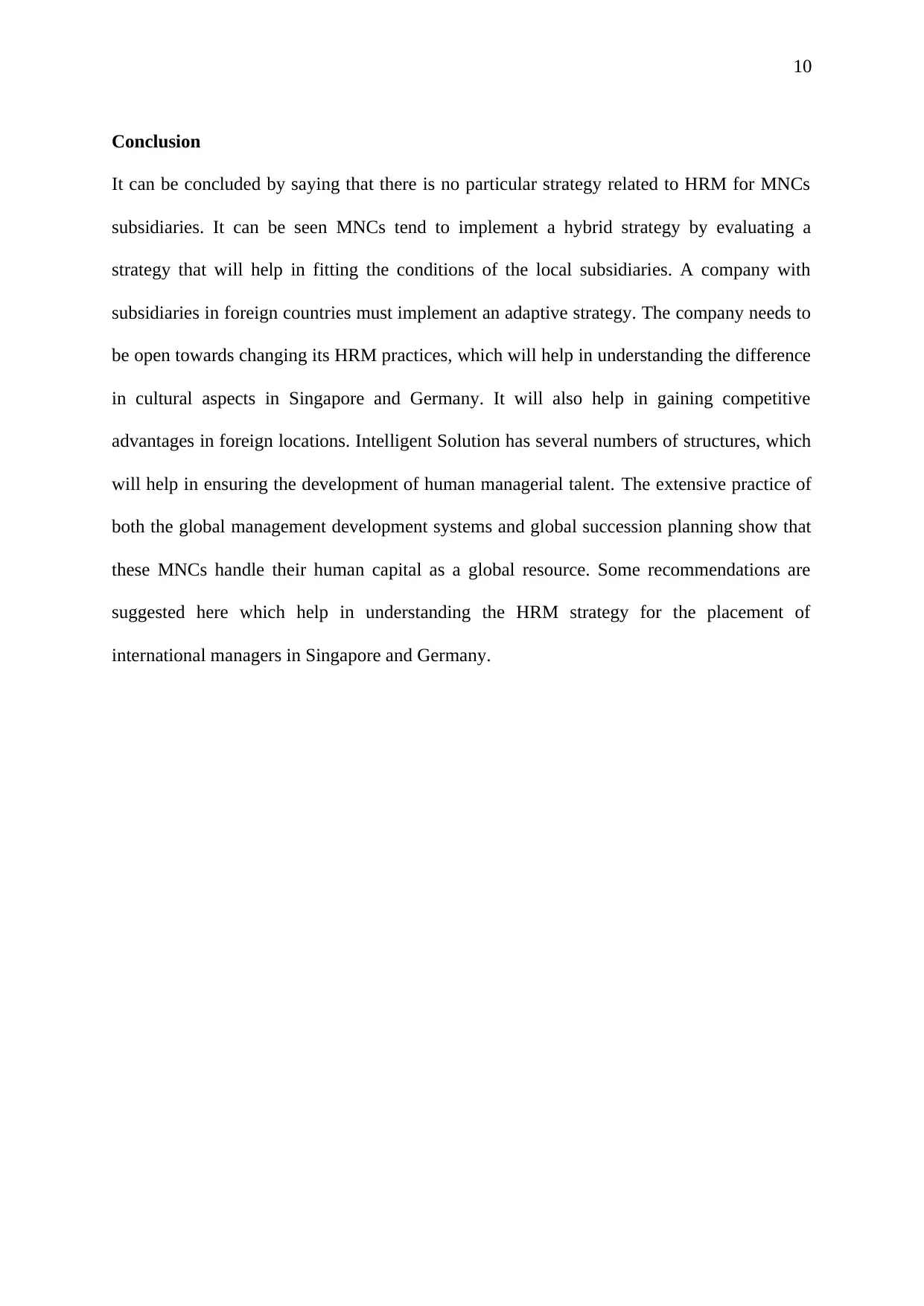
10
Conclusion
It can be concluded by saying that there is no particular strategy related to HRM for MNCs
subsidiaries. It can be seen MNCs tend to implement a hybrid strategy by evaluating a
strategy that will help in fitting the conditions of the local subsidiaries. A company with
subsidiaries in foreign countries must implement an adaptive strategy. The company needs to
be open towards changing its HRM practices, which will help in understanding the difference
in cultural aspects in Singapore and Germany. It will also help in gaining competitive
advantages in foreign locations. Intelligent Solution has several numbers of structures, which
will help in ensuring the development of human managerial talent. The extensive practice of
both the global management development systems and global succession planning show that
these MNCs handle their human capital as a global resource. Some recommendations are
suggested here which help in understanding the HRM strategy for the placement of
international managers in Singapore and Germany.
Conclusion
It can be concluded by saying that there is no particular strategy related to HRM for MNCs
subsidiaries. It can be seen MNCs tend to implement a hybrid strategy by evaluating a
strategy that will help in fitting the conditions of the local subsidiaries. A company with
subsidiaries in foreign countries must implement an adaptive strategy. The company needs to
be open towards changing its HRM practices, which will help in understanding the difference
in cultural aspects in Singapore and Germany. It will also help in gaining competitive
advantages in foreign locations. Intelligent Solution has several numbers of structures, which
will help in ensuring the development of human managerial talent. The extensive practice of
both the global management development systems and global succession planning show that
these MNCs handle their human capital as a global resource. Some recommendations are
suggested here which help in understanding the HRM strategy for the placement of
international managers in Singapore and Germany.
Secure Best Marks with AI Grader
Need help grading? Try our AI Grader for instant feedback on your assignments.
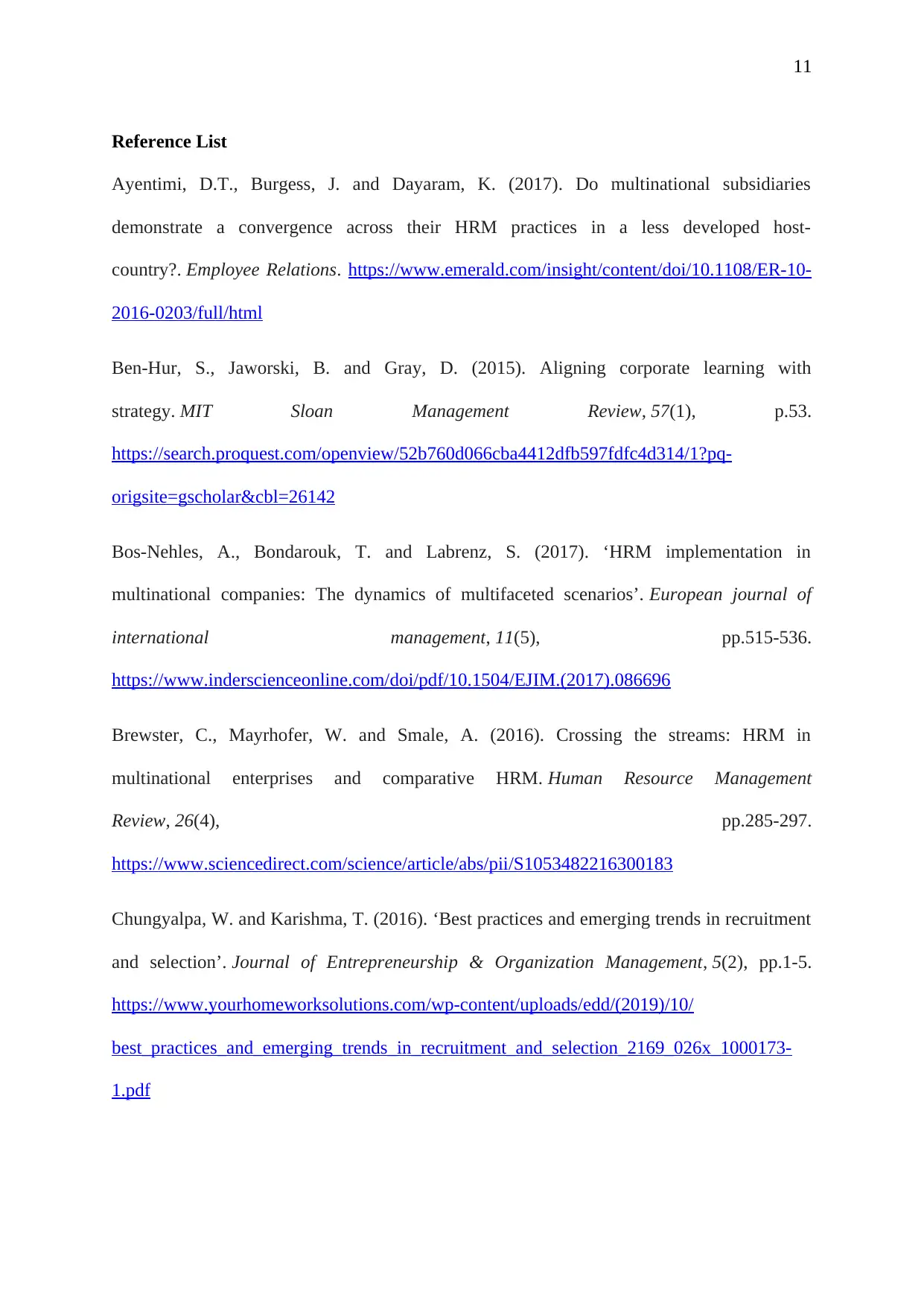
11
Reference List
Ayentimi, D.T., Burgess, J. and Dayaram, K. (2017). Do multinational subsidiaries
demonstrate a convergence across their HRM practices in a less developed host-
country?. Employee Relations. https://www.emerald.com/insight/content/doi/10.1108/ER-10-
2016-0203/full/html
Ben-Hur, S., Jaworski, B. and Gray, D. (2015). Aligning corporate learning with
strategy. MIT Sloan Management Review, 57(1), p.53.
https://search.proquest.com/openview/52b760d066cba4412dfb597fdfc4d314/1?pq-
origsite=gscholar&cbl=26142
Bos-Nehles, A., Bondarouk, T. and Labrenz, S. (2017). ‘HRM implementation in
multinational companies: The dynamics of multifaceted scenarios’. European journal of
international management, 11(5), pp.515-536.
https://www.inderscienceonline.com/doi/pdf/10.1504/EJIM.(2017).086696
Brewster, C., Mayrhofer, W. and Smale, A. (2016). Crossing the streams: HRM in
multinational enterprises and comparative HRM. Human Resource Management
Review, 26(4), pp.285-297.
https://www.sciencedirect.com/science/article/abs/pii/S1053482216300183
Chungyalpa, W. and Karishma, T. (2016). ‘Best practices and emerging trends in recruitment
and selection’. Journal of Entrepreneurship & Organization Management, 5(2), pp.1-5.
https://www.yourhomeworksolutions.com/wp-content/uploads/edd/(2019)/10/
best_practices_and_emerging_trends_in_recruitment_and_selection_2169_026x_1000173-
1.pdf
Reference List
Ayentimi, D.T., Burgess, J. and Dayaram, K. (2017). Do multinational subsidiaries
demonstrate a convergence across their HRM practices in a less developed host-
country?. Employee Relations. https://www.emerald.com/insight/content/doi/10.1108/ER-10-
2016-0203/full/html
Ben-Hur, S., Jaworski, B. and Gray, D. (2015). Aligning corporate learning with
strategy. MIT Sloan Management Review, 57(1), p.53.
https://search.proquest.com/openview/52b760d066cba4412dfb597fdfc4d314/1?pq-
origsite=gscholar&cbl=26142
Bos-Nehles, A., Bondarouk, T. and Labrenz, S. (2017). ‘HRM implementation in
multinational companies: The dynamics of multifaceted scenarios’. European journal of
international management, 11(5), pp.515-536.
https://www.inderscienceonline.com/doi/pdf/10.1504/EJIM.(2017).086696
Brewster, C., Mayrhofer, W. and Smale, A. (2016). Crossing the streams: HRM in
multinational enterprises and comparative HRM. Human Resource Management
Review, 26(4), pp.285-297.
https://www.sciencedirect.com/science/article/abs/pii/S1053482216300183
Chungyalpa, W. and Karishma, T. (2016). ‘Best practices and emerging trends in recruitment
and selection’. Journal of Entrepreneurship & Organization Management, 5(2), pp.1-5.
https://www.yourhomeworksolutions.com/wp-content/uploads/edd/(2019)/10/
best_practices_and_emerging_trends_in_recruitment_and_selection_2169_026x_1000173-
1.pdf
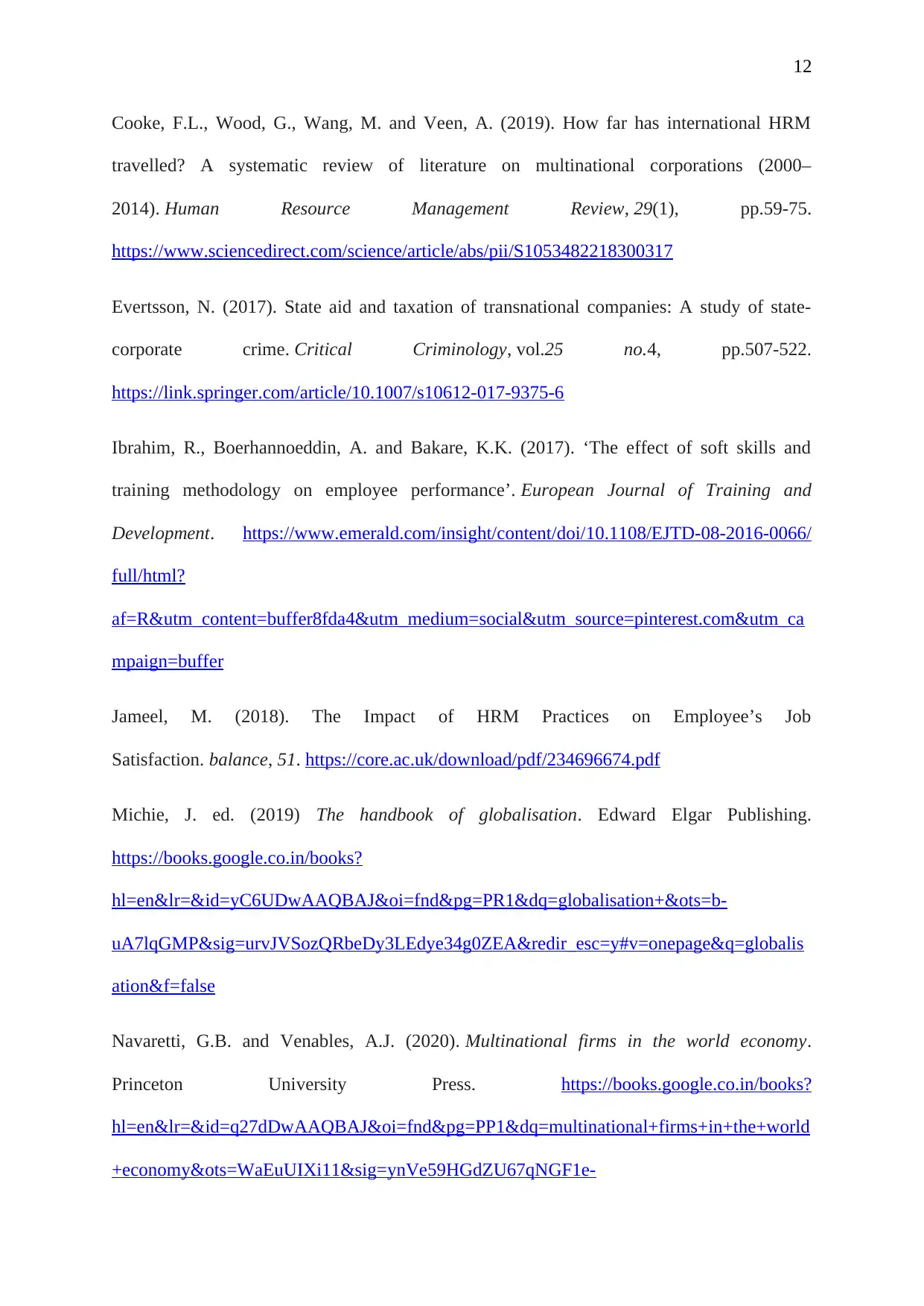
12
Cooke, F.L., Wood, G., Wang, M. and Veen, A. (2019). How far has international HRM
travelled? A systematic review of literature on multinational corporations (2000–
2014). Human Resource Management Review, 29(1), pp.59-75.
https://www.sciencedirect.com/science/article/abs/pii/S1053482218300317
Evertsson, N. (2017). State aid and taxation of transnational companies: A study of state-
corporate crime. Critical Criminology, vol.25 no.4, pp.507-522.
https://link.springer.com/article/10.1007/s10612-017-9375-6
Ibrahim, R., Boerhannoeddin, A. and Bakare, K.K. (2017). ‘The effect of soft skills and
training methodology on employee performance’. European Journal of Training and
Development. https://www.emerald.com/insight/content/doi/10.1108/EJTD-08-2016-0066/
full/html?
af=R&utm_content=buffer8fda4&utm_medium=social&utm_source=pinterest.com&utm_ca
mpaign=buffer
Jameel, M. (2018). The Impact of HRM Practices on Employee’s Job
Satisfaction. balance, 51. https://core.ac.uk/download/pdf/234696674.pdf
Michie, J. ed. (2019) The handbook of globalisation. Edward Elgar Publishing.
https://books.google.co.in/books?
hl=en&lr=&id=yC6UDwAAQBAJ&oi=fnd&pg=PR1&dq=globalisation+&ots=b-
uA7lqGMP&sig=urvJVSozQRbeDy3LEdye34g0ZEA&redir_esc=y#v=onepage&q=globalis
ation&f=false
Navaretti, G.B. and Venables, A.J. (2020). Multinational firms in the world economy.
Princeton University Press. https://books.google.co.in/books?
hl=en&lr=&id=q27dDwAAQBAJ&oi=fnd&pg=PP1&dq=multinational+firms+in+the+world
+economy&ots=WaEuUIXi11&sig=ynVe59HGdZU67qNGF1e-
Cooke, F.L., Wood, G., Wang, M. and Veen, A. (2019). How far has international HRM
travelled? A systematic review of literature on multinational corporations (2000–
2014). Human Resource Management Review, 29(1), pp.59-75.
https://www.sciencedirect.com/science/article/abs/pii/S1053482218300317
Evertsson, N. (2017). State aid and taxation of transnational companies: A study of state-
corporate crime. Critical Criminology, vol.25 no.4, pp.507-522.
https://link.springer.com/article/10.1007/s10612-017-9375-6
Ibrahim, R., Boerhannoeddin, A. and Bakare, K.K. (2017). ‘The effect of soft skills and
training methodology on employee performance’. European Journal of Training and
Development. https://www.emerald.com/insight/content/doi/10.1108/EJTD-08-2016-0066/
full/html?
af=R&utm_content=buffer8fda4&utm_medium=social&utm_source=pinterest.com&utm_ca
mpaign=buffer
Jameel, M. (2018). The Impact of HRM Practices on Employee’s Job
Satisfaction. balance, 51. https://core.ac.uk/download/pdf/234696674.pdf
Michie, J. ed. (2019) The handbook of globalisation. Edward Elgar Publishing.
https://books.google.co.in/books?
hl=en&lr=&id=yC6UDwAAQBAJ&oi=fnd&pg=PR1&dq=globalisation+&ots=b-
uA7lqGMP&sig=urvJVSozQRbeDy3LEdye34g0ZEA&redir_esc=y#v=onepage&q=globalis
ation&f=false
Navaretti, G.B. and Venables, A.J. (2020). Multinational firms in the world economy.
Princeton University Press. https://books.google.co.in/books?
hl=en&lr=&id=q27dDwAAQBAJ&oi=fnd&pg=PP1&dq=multinational+firms+in+the+world
+economy&ots=WaEuUIXi11&sig=ynVe59HGdZU67qNGF1e-
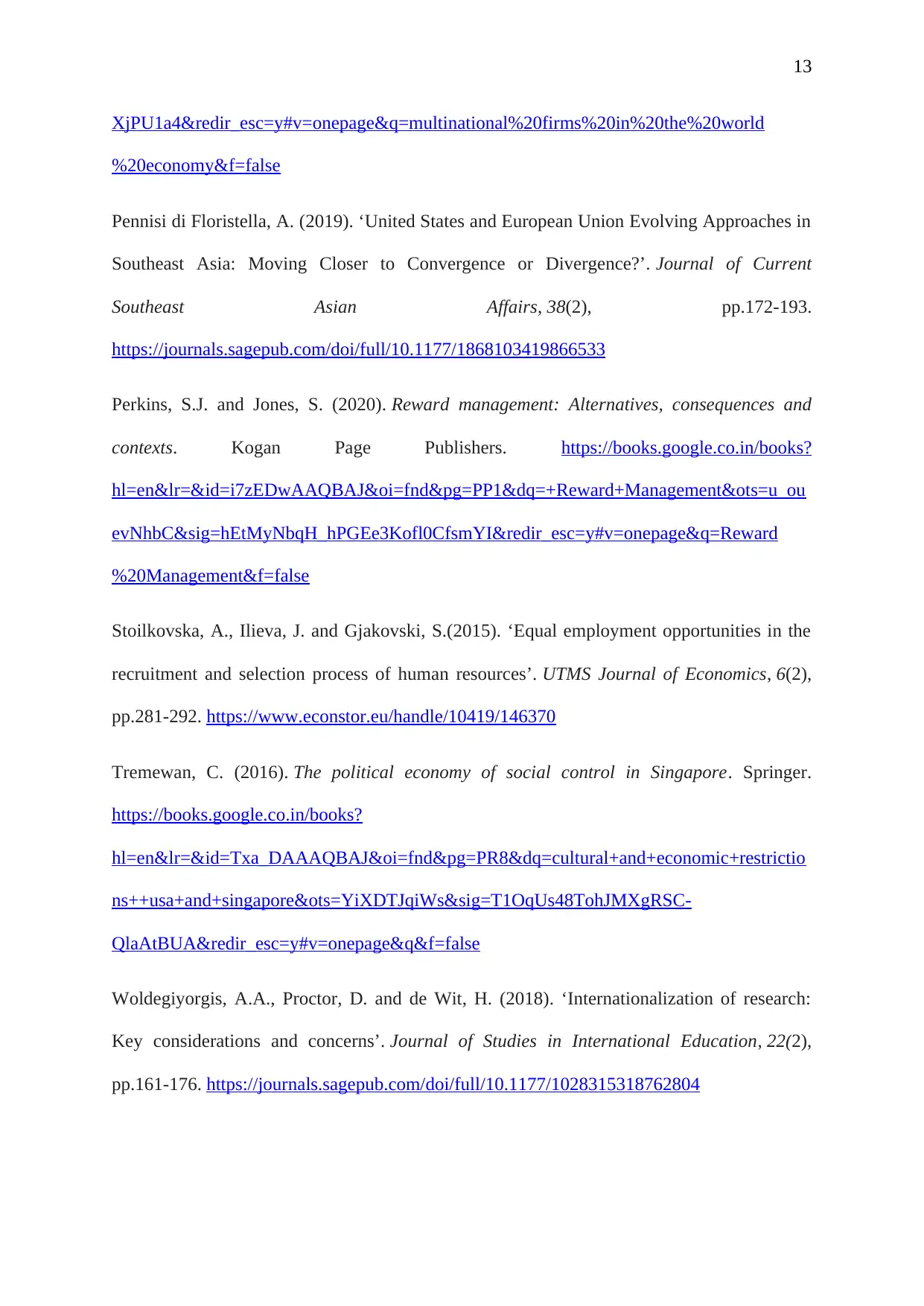
13
XjPU1a4&redir_esc=y#v=onepage&q=multinational%20firms%20in%20the%20world
%20economy&f=false
Pennisi di Floristella, A. (2019). ‘United States and European Union Evolving Approaches in
Southeast Asia: Moving Closer to Convergence or Divergence?’. Journal of Current
Southeast Asian Affairs, 38(2), pp.172-193.
https://journals.sagepub.com/doi/full/10.1177/1868103419866533
Perkins, S.J. and Jones, S. (2020). Reward management: Alternatives, consequences and
contexts. Kogan Page Publishers. https://books.google.co.in/books?
hl=en&lr=&id=i7zEDwAAQBAJ&oi=fnd&pg=PP1&dq=+Reward+Management&ots=u_ou
evNhbC&sig=hEtMyNbqH_hPGEe3Kofl0CfsmYI&redir_esc=y#v=onepage&q=Reward
%20Management&f=false
Stoilkovska, A., Ilieva, J. and Gjakovski, S.(2015). ‘Equal employment opportunities in the
recruitment and selection process of human resources’. UTMS Journal of Economics, 6(2),
pp.281-292. https://www.econstor.eu/handle/10419/146370
Tremewan, C. (2016). The political economy of social control in Singapore. Springer.
https://books.google.co.in/books?
hl=en&lr=&id=Txa_DAAAQBAJ&oi=fnd&pg=PR8&dq=cultural+and+economic+restrictio
ns++usa+and+singapore&ots=YiXDTJqiWs&sig=T1OqUs48TohJMXgRSC-
QlaAtBUA&redir_esc=y#v=onepage&q&f=false
Woldegiyorgis, A.A., Proctor, D. and de Wit, H. (2018). ‘Internationalization of research:
Key considerations and concerns’. Journal of Studies in International Education, 22(2),
pp.161-176. https://journals.sagepub.com/doi/full/10.1177/1028315318762804
XjPU1a4&redir_esc=y#v=onepage&q=multinational%20firms%20in%20the%20world
%20economy&f=false
Pennisi di Floristella, A. (2019). ‘United States and European Union Evolving Approaches in
Southeast Asia: Moving Closer to Convergence or Divergence?’. Journal of Current
Southeast Asian Affairs, 38(2), pp.172-193.
https://journals.sagepub.com/doi/full/10.1177/1868103419866533
Perkins, S.J. and Jones, S. (2020). Reward management: Alternatives, consequences and
contexts. Kogan Page Publishers. https://books.google.co.in/books?
hl=en&lr=&id=i7zEDwAAQBAJ&oi=fnd&pg=PP1&dq=+Reward+Management&ots=u_ou
evNhbC&sig=hEtMyNbqH_hPGEe3Kofl0CfsmYI&redir_esc=y#v=onepage&q=Reward
%20Management&f=false
Stoilkovska, A., Ilieva, J. and Gjakovski, S.(2015). ‘Equal employment opportunities in the
recruitment and selection process of human resources’. UTMS Journal of Economics, 6(2),
pp.281-292. https://www.econstor.eu/handle/10419/146370
Tremewan, C. (2016). The political economy of social control in Singapore. Springer.
https://books.google.co.in/books?
hl=en&lr=&id=Txa_DAAAQBAJ&oi=fnd&pg=PR8&dq=cultural+and+economic+restrictio
ns++usa+and+singapore&ots=YiXDTJqiWs&sig=T1OqUs48TohJMXgRSC-
QlaAtBUA&redir_esc=y#v=onepage&q&f=false
Woldegiyorgis, A.A., Proctor, D. and de Wit, H. (2018). ‘Internationalization of research:
Key considerations and concerns’. Journal of Studies in International Education, 22(2),
pp.161-176. https://journals.sagepub.com/doi/full/10.1177/1028315318762804
Paraphrase This Document
Need a fresh take? Get an instant paraphrase of this document with our AI Paraphraser

14
1 out of 14
Related Documents
Your All-in-One AI-Powered Toolkit for Academic Success.
+13062052269
info@desklib.com
Available 24*7 on WhatsApp / Email
![[object Object]](/_next/static/media/star-bottom.7253800d.svg)
Unlock your academic potential
© 2024 | Zucol Services PVT LTD | All rights reserved.




